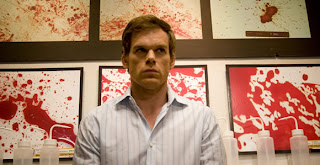Well, another summer at the movies is officially in the books. Here’s my recap of the summer’s best and worst cinematic offerings, divided into three categories and followed by their starred rating (out of ****):
The Best of the Best:

Exit Through the Gift Shop: A fascinating, intriguing and howlingly funny documentary of sorts from the guerilla art phantom known as Banksy. By following documentarian Thierry Guetta, who made it his duty to chronicle the adventures of street artists across L.A., and then turning on a dime to attack people like Guetta himself, Banksy stuns us by testing the audience on what constitutes art while delivering a film that's a masterpiece in itself. [****]
Toy Story 3: An exceptional sequel that works on two levels: first, as an exuberant roller-coaster of sparkling visuals, exhilarating set pieces and pure manic fun, and second, as an emotionally grueling throat-grabber. It’s a dark, intelligent and moving meditation about growing up and moving on. Pixar understands that this Story wouldn’t be worth telling if not for these toys we have such personal investment in. [****]
Inception: No wonder this film has enraptured audiences with its big thrills and even bigger ideas: it’s conceptually ambitious, emotionally complex and thought-provoking while delivering one of the most labyrinthian science-fiction universes ever constructed, molded entirely from the mind of writer/director Christopher Nolan. DiCaprio gives one of his most assured performances as a man having trouble grasping hold of what’s real and what’s not. Meanwhile, he must lead a complex espionage mission that's quite the mind-bender - literally. With layers upon layers constantly being added to this sci-fi puzzle, Inception makes you ponder even as it leaves you spellbound. [***1/2]

Lebanon: Yes, this is another Israeli film set during the Lebanon War. But what makes this one unique is how chillingly realistic it is. Almost the entirety of this 93-minute film is spent within the confines of a grimy tank (director Samuel Maoz was a gunner in a tank during the War, and much of the film is derived from his experiences). With the viewfinder of the tank being the only porthole to the violence outside, Maoz’s film is both gripping and almost unbearably suspenseful. War movies mainly succeed by placing the audience within the strife, and Lebanon achieves this with technical mastery and utter simplicity. [***1/2]
Despicable Me: Sure, it doesn’t have the emotional depth of Pixar’s best works. But this delightful animated flick about a dastardly villain named Gru who must take care of three orphaned girls is slyly funny without being demeaning and sentimental without being sappy. Steve Carell uses a European accent to great effect to voice Gru, while the infectiously funny team of minions should just get a film of their own. [***]
The Kids are All Right: The adults are more than all right, too. I’m referring to the pitch-perfect performances by Annette Bening and Julianne Moore as a lesbian couple whose marriage is tested by the arrival of the sperm-donor father (Mark Ruffalo). The poignancy and messiness of marriage are so accurately depicted – without ever the need to comment on the couple’s homosexuality – that it almost makes us forget about an unconvincing plot development. Almost. [***]

Micmacs: From Jean-Pierre Jeunet (Amelie) comes a comedy that is less of a coherent film than one dazzling set-piece of shenanigans after another. Dany Boon is a video store owner with a bullet submerged inside his head. Alongside a crew of colourful companions, he goes against the weapons manufacturers who made the bullet. Even though the film aims for quirk over substance a few too many times, Jeunet's tribute to silent-era zaniness of the Keaton-Lloyd variety is abundantly creative with its visual humour and sly comedic timing. [***]
Restrepo: Journalist Sebastian Junger and photographer Tim Hetherington spent one year examining the lives of an American platoon in the Korengal, a valley in Afghanistan, not far from Taliban forces. Restrepo is a fine piece of photojournalism, shot from handheld cameras (even during combat) and starring the courageous men that lived and fought in one of the most dangerous postings in Afghanistan. [***]
Rush: Beyond the Lighted Stage: The progressive rock trio documented in Sam Dunn and Scott McFadyen’s documentary says in one of their biggest hits that, “If you choose not to decide, you still have made a choice.” If you choose not to see this documentary, you’ve made a choice to ignore an insightful and hugely entertaining flick. This doc tells all about one of rock and roll’s most important and prolific groups – a group which managed to sell millions of albums without ever shattering their illusion of integrity – with the help of some excellent archival material and a flurry of colourful interviews. {***]

The Trotsky: High school comedies are usually lowbrow, so a Canadian-made film about a student who starts a revolution becomes he claims he’s the reincarnation of a revolutionary manages to be something quite different. It’s refreshingly witty and features a tour-de-force from Jay Baruchel as the eccentric if sweet-natured title character. Even though the film’s subplots often feel contrived and a tad rushed, this is Baruchel’s movie. And like the figure he emulates, he effective leads the film to the status of a minor Canadian classic. [***]
Winter’s Bone: A tough film in the way it demands its audience to stay with its bleak Ozark surroundings and nearly hopeless tone, what makes Winter’s Bone so effective is in the soul of protagonist Ree Dolly. Dolly’s journey to find her bail-jumping, drug-dealing father while keeping her family safe from a community of criminals is riveting. And she’s portrayed with grit and grace by Jennifer Lawrence. The film is slow in building momentum and sometimes tough to stomach, but the raw, tragic drama is gripping. [***]
The Middle of the Pack:
The A-Team: If you go into The A-Team expecting a work of high art, prepare to leave disappointed. Sure, the plot’s not much and the characters are essentially cartoons, but as a highly caffeinated action picture, the film succeeds. That’s mostly due to the ensemble cast – which includes Liam Neeson and District 9’s Sharlto Copley – who convincingly hold all of the lunacy together. [**1/2]

Ajami: The stories within the titular Jaffa town which houses Jews, Arabs and Christians are compelling. The storytelling techniques which co-directors Scandar Copti and Yaron Shani use to tell these stories make this feature not just one about struggle, but one which is a struggle to follow. The numerous characters and subplots are a crowded bunch, and the non-linear storytelling doesn’t help matters. It’s worth noting that this is a film crafted with both Israeli and Palestinian crews, and certain sequences are quite gripping, but it’s a bit too muddled and confusing to make much of an impact. [**1/2]
Iron Man 2: The sequel to the massively successful 2008 comic-book adaptation is flashier and contains a broader array of gadgets than its predecessor. But while it’s grandly entertaining (Favreau has improved as an action director), and features another electric performance from Downey Jr., the underwritten subplots and lack of engaging secondary characters makes this follow-up quite disposable. That’s what happens when more time is focused on the machines than to the people inside of them. [**1/2]
Robin Hood: Oh, Errol Flynn, how we miss you so. While that’s not to disservice this handsomely mounted and enthralling adventure, Ridley Scott’s origin story of the Prince of Thieves lacks the fun we expect from the legend. [**1/2]
Salt: Homaging the Cold War era espionage thrillers that the film’s director, Philip Noyce, used to make, Angelina Jolie plays a CIA agent who may also be a Russian spy. The film becomes increasingly preposterous, and the final third is just ridiculous. But the pacing is quick and efficient, and Jolie continues to prove her stature as a bona-fide action star. [**1/2]

Scott Pilgrim Vs. The World: Scott Pilgrim (Michael Cera) is a Toronto teenager who must battle his object of affection’s seven ex-boyfriends to claim her. The battles are fought in a universe styled like a video-game, and that’s where Edgar Wright dazzles us with his visual flair and entertains us with his referential humour. But elsewhere, the film leaves us cold. Not a single character or situation feels authentic. It's hard to care for the outcome of the battles if we don’t feel for what’s at stake. [**1/2]
The Bottom of the Barrel:
The Other Guys: Will Ferrell plays the oblivious good cop. Mark Wahlberg plays the hard-nosed tough guy. Together, their antics in this sendup of the police buddy comedy should work. And they do… for the first 45 minutes. But as two-dimensional characters in an only sporadically funny film, there’s only so much material the two can tolerate before the film eventually becomes tiresome. [**]
Knight and Day: Tom Cruise is a suave assassin who kidnaps Cameron Diaz to help with some hijinks and operations around the world. Too bad the film’s all smiles, no substance. There is no spark of chemistry between the two actors. There are no thrills in the mundane action sequences. And there is not an inkling of wit or humour either. If it weren’t for the A-list pairing of Diaz and Cruise, it would be hard to care for a single element of this dimwitted action-comedy. [*1/2]
The Expendables: Sylvester Stallone first made an impression by handily fighting large carcasses of meat in Rocky. It’s too bad what may be his final big-screen affair – as a leader of a testosterone-filled group of mercenaries – is also a big hunk of meat. It's a bona-fide turkey. Even though the projector went out an hour into my screening (thank goodness), I feel safe to say that there were enough insipid attempts at acting, lazy attempts at character and plot development, and purely ineffective attempts at staging coherent combat scenes to garner this film the one-star rating it already deserved. [*]


























